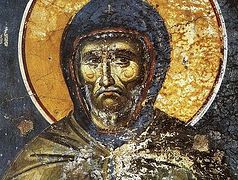 Alas, our world is filled with evil and suffering. Since the very moment of the fall, human nature has been infected with sin, which has become a human property. As the Old Testament says, for there is no man that sinneth not (3 Kings 8:46).
Alas, our world is filled with evil and suffering. Since the very moment of the fall, human nature has been infected with sin, which has become a human property. As the Old Testament says, for there is no man that sinneth not (3 Kings 8:46).
And this sinfulness results in something that is known to each one of us: envy, anger, judging, resentment, lies and much more. And in more terrible and global manifestations it becomes grounds for the hatred of people for their religion, nationality, skin color, lifestyle, political views, and so forth. Such hatred throughout history has become the basis of numerous wars and genocides with brutal executions and torture. This was the case in the past, and it is the same now.
The whole world lieth in wickedness (1 Jn. 5:19). And the paradox is that every person who feels hatred considers he is good and right. Deep down, everyone would like this evil not to be in the world, but it is there. To a greater or lesser extent, it is in each one of us. And it is sad to realize this hopelessness.
And there are reasons for sadness in everyone’s life—not only public life, but also personal. Sadness is a natural reaction to life’s difficulties and losses, especially the loss of your loved ones. However, if you completely succumb to sadness, it can develop into despondency. Despondency is a sinful state that occurs when a person refuses to fight sadness and sinks into the abyss of despair. It is important to distinguish between these two states and not let melancholy take over.
While sadness appears due to external factors, despondency emerges in the person himself. And in spiritual life it is accompanied by disbelief in Divine Providence, the cooling of faith, lack of trust in God and love for Him, your neighbors and yourself. A despondent person no longer desires prayer and salvation, sinking deeper into this abyss.
In some cases, this condition can even develop into depression. In popular culture this word is commonly used to describe deep melancholy, but this is not the case at all. Depression is a severe psychophysiological condition and it is impossible to get out of it without medical help. We will not dwell on it in detail, since the subject of depression is very extensive and belongs to the field of psychiatry.
So what should we do? How can we not get despondent when there is so much terrible news around or when something irremediable happens in our personal life? The answer is one: we should find the strength to overcome sadness in order not to stay in it for a long time. But how can we do it?
First of all, we should remember our faith. For an Orthodox person, life always has meaning thanks to his love for God and his neighbor. A believer knows that God will never forsake him, even when the world seems evil and hopeless. Entrust your worries and problems to God. As the Psalter says: Cast thy care upon the Lord, and He shall sustain thee (Ps. 54:23). Just realizing this will make it easier to deal with anxiety and sadness.
When it comes to the loss of our loved ones, we must keep in mind one fact: weeping for the departed, we actually weep for ourselves. The soul of a newly departed person has begun a new path, that of the particular judgment and eternal life. The departed go to their previously reposed relatives—to their beloved grandparents, to their dear friends. A meeting full of love and joy awaits them. And we weep for ourselves. It’s me who won’t see my reposed loved one for a long time; it’s me who will miss him here on earth. By crying I actually pity myself. For non-believers this is really a tragedy and a nightmare, because they do not believe in the afterlife, and for them death is the end. But God promised us that we will all see each other again there and spend eternity together. We are not separated forever.
We often look at our lives from the perspective of “here and now” and rarely think about life and death from the perspective of eternity. God wants a person to receive salvation in eternal life; therefore, He takes him from here when he is most ready. It seems unfair to us. We think, “He could have lived much longer”, but from the perspective of eternity it was the best moment for him to pass into eternal life. This moment is the best for this particular person. He will have the joy of meeting his loved ones who have gone there and are with God Himself. He needs our prayers now more than ever. But we continue to feel tearfully sorry for ourselves, when we should be supporting the reposed with intense prayer and love.
Our life here is just a preparation for the life to come. I will never forget the story of one sick girl. She was born into a religious family, was bedridden, but had a lucid mind—she could talk and pray. She lived till about twenty. And one morning she told her parents, “Wash me today—I’m going home.” Her parents didn’t understand her, because she was at home, and she couldn’t walk. As usual, they avoided thoughts of death. But her request was fulfilled. In the evening, with a smile on her lips, the girl closed her eyes forever.
I have seen perhaps the most Orthodox [among the heterodox] attitude towards death and the afterlife in the Mexican Day of the Dead. It is not their custom to mourn for the departed. Moreover, they believe that our tears only interfere with them. This holiday for them is an invisible meeting with the dead. Mexicans organize festivals with music and dancing, treats, fun and joy. Yes, it is a little this-worldly and partly pagan; they believe that the departed come to visit them during that day, so the holiday begins with a family feast. In the evening everyone goes to the cemetery, as if to a train station, to “escort” the departed back to the afterlife. And in addition to songs and treats, they communicate with the reposed as with the living—they tell them news and share their joys and experiences with them. This holiday is filled with the desire to ensure that the departed do not bemoan the separation, but rejoice in the meeting—that is, everything is not done for the living, but for those in eternity.
Don’t let sadness overcome your soul. Remember that sadness does not belong to you, but is an external force that can lead you to despondency. The Apostle Paul tells us: Rejoice evermore. Pray without ceasing. In every thing give thanks (1 Thess. 5:16-18). Even if it seems that nothing good is happening around, think about what you should thank God for. There is joy in simple things. Remember that life in all its manifestations is God’s most important gift to man. Learn to appreciate the gifts of life and rejoice that we were born, baptized, have our loved ones, are still alive, and can do a little more good.
Do not forget that the world, despite its misfortunes, is still full of goodness and beauty. Take the time to see this goodness around you, and don’t yield to gloom. Do good yourself: help your loved ones and give alms to the poor. This is also stated in the Psalter: Trust in the Lord, and do good; so shalt thou dwell in the land, and verily thou shalt be fed (Ps. 36:3). After all, the Lord teaches us that we must serve our neighbors as ourselves, and not vice versa. Our own sins are the cause of our difficulties, and not people around us.
And, of course, do not forget about prayer. The Lord is willing to be with each one of us, but He will participate only in the lives of those who ask Him to do so. God is not intrusive. And if someone does not ask God to participate in his life and help him, He will not act in the life of such a person, because He Himself gave us free will. And only with His help are we able to overcome despondency, as well as other sins. As the Apostle Paul said, I can do all things through Christ which strengtheneth me (Phil. 4:13).
A person in a state of despondency stops praying and trusting God. He seems to be drugged by his sadness and melancholy and eventually stops doing anything useful for himself and his loved ones. This is why despondency is dangerous. But it is prayer and mutual help that can relieve sadness and give hope for the future and for the help of the Lord. This is how the Apostle Paul comforts the Christians of Corinth: There hath no temptation taken you but such as is common to man: but God is faithful, who will not suffer you to be tempted above that ye are able; but will with the temptation also make a way to escape, that ye may be able to bear it (1 Cor. 10:13).
An example of how to deal with sadness is the story of the holy King David. When he experienced betrayal and the loss of his son, he felt deep sorrow. However, instead of succumbing to despondency he turned to God and found solace in repentance and prayer.
The book of Proverbs says: Trust in the Lord with all thine heart; and lean not unto thine own understanding. In all thy ways acknowledge Him, and He shall direct thy paths (Prov. 3: 5–6).
Sadness and sorrows are challenges that every person faces on their life path. However, by following the instructions of the Bible and drawing strength from faith, we can learn to deal with them and not let them take over our souls. Believers always find comfort and support in communion with God through prayer and reading the Bible, which helps us keep hope and fight against despondency. We must remember that God is always with us and ready to help us overcome any problems.
Thou wilt shew me the path of life: in Thy presence is fulness of joy; at Thy right hand there are pleasures for evermore (Ps. 15:11).




